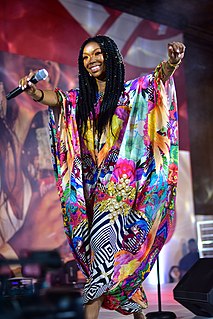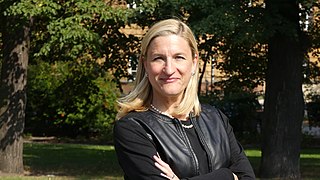A Quote by Joey Reiman
In my early life my mother tried to create a nurturing environment in which my mind could play. Her big rule was "Never lose in your imagination." She told me that thoughts were things and that I would become the thing I thought of most. This kind of empowerment is crucial to creative thinking.
Related Quotes
The casting director on the movie made me aware of her. She told me what to watch Starter For Ten, which I did and thought she was great in. She was just so charming and beautiful. But I felt she could probably look plain if we tried. And when I subsequently met with her, I was so charmed by her vulnerability and sweetness. Those were two qualities that were the most important for that character.
Even after the age of 50 it was impossible for me to see my mother as a human being. I felt she was a monster, and she had subtly been influencing my behavior and my thoughts and my dreams for so long that she was kind of a monster; she was a demon. And when I brought her back to life, I could feel that malevolent presence around me again, that woman who was totally incapable of giving nurturing to anybody, and, you know, her selfishness and her withdrawn indifference to everything but her own needs.
I've figured out the secret. Your mind is your power; you have to work with your mind and work with your own thoughts about your own life. If you spend so much time thinking, "This industry is male-dominated. It's sexist. It's this. It's that," then that's what the picture will always be. I remember when I was coming up, I didn't have those thoughts. My mom told me I could be whatever I wanted to be and I could be as bright of a star as I was meant to be. So, that's where I put all of my focus and my thought...into what I could do. And I carry that with me now.
I think, when I started to become successful in the movie business, my mother was very, very worried. She thought no one would want to marry me and she thought that was the most important thing. And she thought that it would affect my personal relations. And she said how worried she was that people would take advantage of me or I would meet the wrong people. When I was made head of the studio, one of her first things was, "Well, now no one will marry you. I hope you'll be happy, whatever."
One thing I did have under my belt was, my mother lost her mother when she was 11. She mourned her mother her whole life and made my grandmother seem present even though I never met her. I couldn't imagine how my mom could go on but she did, she took care of us, she worked two jobs and had four children. She was such a good example of how to conduct oneself in a time of grief. When I lost my husband, I tried to model myself as much as I could on her.
Her little shoulders drove me mad; I hugged her and hugged her. And she loved it. 'I love love,' she said, closing her eyes. I promised her beautiful love. I gloated over her. Our stories were told; we subsided into silence and sweet anticipatory thoughts. It was as simple as that. You could have all your Peaches and Bettys and Marylous and Ritas and Camilles and Inezes in this world; this was my girl and my kind of girlsoul, and I told her that.
My mother told me I said to her, at age three, 'I'm going to go to Italy and get my father in a tractor.' 'You've never seen quite so fierce a little boy as you were,' she told me. She tried to explain that I couldn't get my father in a tractor. Apparently I looked at her and narrowed my eyes and said, 'In that case, I'm going in a double-decker bus,' and stomped off. Which is kind of funny, but it's very sad, as well.
I mean, her father was an alcoholic, and her mother was the suffering wife of a man who she could never predict what he would do, where he would be, who he would be. And it's sort of interesting because Eleanor Roosevelt never writes about her mother's agony. She only writes about her father's agony. But her whole life is dedicated to making it better for people in the kind of need and pain and anguish that her mother was in.
If I could have gotten my way at an early age, I would have entered the priesthood, but my mother informed me that I could not become a priest because I was a girl. It really was the biggest blow to my ego, because it was my calling. When she told me I'd have to be a nun, I looked at her and said, 'I'm not following anyone.'
My mother teaches high school English, and she's an artist and a poet and a sculptor, she's published twelve poetry books. I grew up in a household in Venezuela with living, breathing art installations that were the way that she used to express herself, a highly creative environment where ideas were celebrated, where artistic expression was celebrated. Seeing her as somebody who was always able to have a creative output - if she felt sad, she wrote a poem, if she felt happy, she made a sculpture - I think for me, there was an early interest in finding outlets for my passions.
One day when I was fourteen, I told Charlie that I hated Mother. “Don’t hate her, Jo,” he told me. “Feel sorry for her. She’s not near as smart as you. She wasn’t born with your compass, so she wanders around, bumping into all sorts of walls. That’s sad.” I understood what he meant, and it made me see Mother differently. But wasn’t there some sort of rule that said parents had to be smarter than their kids? It didn’t seem fair.
She asked me what was wrong, and I told her I had to end it. She was surprised, and asked my why I thought so. I told her it wasn't a thought, more a feeling, like I couldn't breathe and knew I had to get some air. It was a survival instinct, I told her. She said it was time for dinner. Then she sat me down and told me not to worry. She said moments like this were like waking up in the middle of the night: You're scared, your'e disoriented, and you're completely convinced you're right. But then you stay awake a little longer and you realize things aren't as fearful as they seem.
If the colleges were better, if they had the power of imparting valuable thought, creative principles, truths which become powers, thoughts which become talents, - if they could cause that a mind not profound should become profound, - we should all rush to their gates: instead of contriving inducements to draw students, you would need to set police at the gates to keep order in the in-rushing multitude.



































